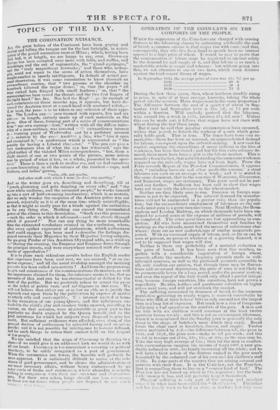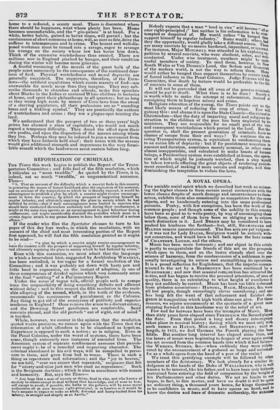OPERATION OF THE CORN-LAWS ON THE COMFORTS OF THE PEOPLE.
WHEN the supporters of the Corn-laws are charged with causing distress to the labouring classes by enhancing artificially the cost of bread, a common excuse is, that wages rise with corn; and that, consequently, they who live from hand to mouth have no interest opposed to a high price of wheat. It would be easy to prove that the remumeration of labour must be regulated in amount solely by the demand for and supply of it, and that lab rur is as much a marketable article as sugar and tobacco : but withmt going into this, we ask attention to one or two facts, which seem decisive against the landowners' theory of wages.
In September 1S:15, the average price of corn was 411s. f1;1. per qr.
1836 41 18:17 5S 4 1838 73 2 During the last three years, then, wheat hasbeen steadily rising in price, in spite of at least average harvests, taking the whole period into the account. Have wages risen in the same proportion ? The difference between the cost of a quarter of wheat in Sep- tember 1835 and September 1838 is 31s. 5d., or 75 per cent.
within a fraction. Will anybody pretend that the labourer, who earned 10s. a week in I 835, receives 17s. ed. now ? Unless this can be made out, it follows that wages have not risen with wheat during the last three years.
But it may be said that peculiar circumstances have occurred, within that period, to disturb the working of a rule which gene- rally holds good. That is true. The times have been very re- markable—there has been an unusual, an unprecedented demand
for labour, consequent upon the railroad-making. A new vent for capital, requiring the expenditure of many millions in the hire of
workmen, has been discovered and but for this extraordinary de- mand, there must have been a glut in the labour-market. This is manila- t from the fact, that notw ithstanding the numerous workmen required on the railisials, wages have not been high. From the Forty-seventh Report of the Poer-law Commissioners, it appears that, " including harvests and other profitable seasons;' a stout labourer can earn on an average 9.s.. a week: and it is etated in the same document, that in the counties of Worcester, Gloucester, and Somerset, wages are stationary. This point need not be pur- sued any further. Sufficient has been said to show that wages have not risen with the advances in the wheat-market.
Neither are they likely soon to rise. Increase in foreign com- merce is not to be expected. The internal demand for manufac- tures will not be augmented in a greater ratio than the popula-
tion; but the extraordinary employment of labourers on the rail- roads must soon in a great measure cease. Next Monday, the Birm-
ingham and London Railway, on which thousands have been em- ployed for several years at the expense of millions of pounds, will be completed. The other great lines are fist approaching to com- pletion. All who have maintained themselves and families by working on the railroads, must find the means of subsistence else- where : there are no new undertakings of similar magnitude pros jected. With an increased supply of labour, and, as far as can be seen at present, no prospect whatever of a growing demand, it is not to be supposed that wages will rise.
Neither is there any probability of a material redaction in
the price of bread. It has been seen that fine weather, to- gether with a considerable importation of foreign wheat, scarcely affects the markets. Inquiries privately made in well- informed quarters, as well as the published accounts accessible to alt, only confirm our opinion, that though there may be fluctua- tions and occasional depressions, the price of corn is not likely to be permanently lower for a long period, under the present system; and even the repeal of the duty would only afford a partial mitiga- tion, because foreign countries, like ourselves, have not grown a superfluity Besides, bohlere and purchasers calculate on higher prices next year, and will not overstock the market.
The suffering occasioned by dearness of bread, to the immense population tubsisting on scanty wages, is scarcely conceivable by those who Wok at their bakers: bills as only one and not the largest item in a long list of expenses. But mark how a rise of fourpencee
halfpenny a loaf operates on the comforts of the poor. A man and hie wife with six children would consume at the least twelve quartern loaves weekly : and this is not an extravagant allowance, when it is remembered that the Sunday joint is generally the only thing in the shape of butcher's meat which they enjoy. Bread forms the chief meet at breakfast, dinner, and supper. Twelve
loaves multiplied by 414.—the difference between W., the price in 1833, and 1014., the price now—make 4.s. 6d. per week; and this 4v. 6d. is to come out of 8s., 10s., 15v., or 2(4., as the case may be. Take the very high average of 15s.; then let the man in comfort- able circumstances imagine his income of (say) eoet. a year gra- dually reduced to 4001., his family increasing all the while; and he will have a faint notion of the distress caused in the poor man'a household by the enhanced cost of his own an I his childreris staff of life. In some parts of the country they are mixing oatmeal and potatoes with their flour. It is the Corn-law, not the Poor-law, that is compelling them to live on a "coarser kind of food." The Poor-law has not forced up wheat to 73s. a quarter: but the land- lords' monop ly has, and will probably keep it thereabout.
Physical suffering is oily part of the misery and mIschief ereaisd by whet have been called the " Devil's laws." The father aid his ettnly work as hard as ever, or harder ; bit they eome Lome to a reduced, a scanty meal. There is discontent where there should be happiness, want where plenty has been. Home becomes uncomfortable, and the" gin-palace" is at hand. For a while, better habits, gained in better times, will prevail ; but the continuance of short commons at home, will, as sure as fate, drive the sufferer to intemperance and to crime. The honest and well-dis- posed workman must be turned into a savage, eager to revenge his wrongs on the society whose law has borne him down. Think of the extensive wretchedness thus created. There are millions now in England pinched by hunger, and their condition during the winter will become more grievous.
A fearful worsening of the morals of the great hulk of the people must necessarily be the consequence of the continued dear- ness of food. Physical wretchedness and moral depravity are generally coexistent. The supporters, therefore, of the Corn- laws—the artificial regulations which create scarcity of food—are answerable for much more than they imagine. They may sub- scribe thousands to churches and schools, make fine speeches about Blacks in the Indies or enslaved White children in factories at home, and sport their philanthropy in all quarters; but as long as they wring high rents by means of Corn-laws from the sweat of a starving population, all their professions are as " sounding brass and a tinkling cymbal." They are practically the authors of wretchedness and crime ; they are a plague-spot tainting the land.
We understand that the prospect of two or three years' high prices has alarmed a class of capitalists, who would not much regard a temporary difficulty. They dread the effect upon their own profits, and upon the disposition of the masses among whom they live. Perhaps they may be induced to join a movement from which they have hitherto held aloof: their union with the masses would give additional strength and importance to the very formi- iable assault which the landowners must sustain before long.



























 Previous page
Previous page